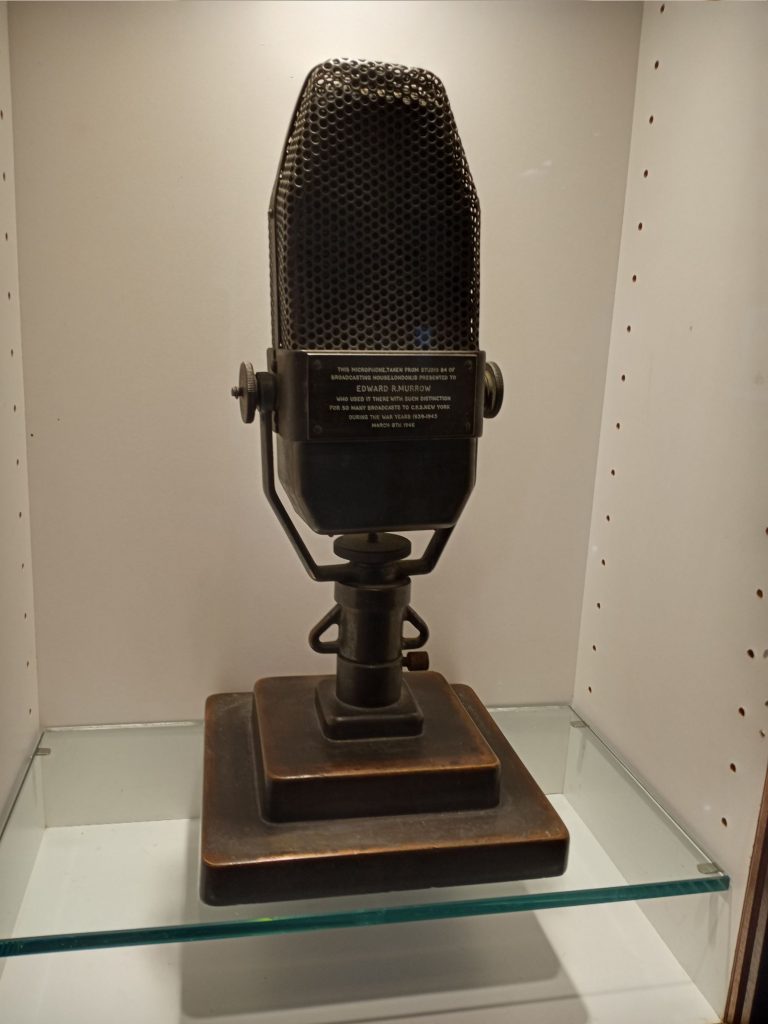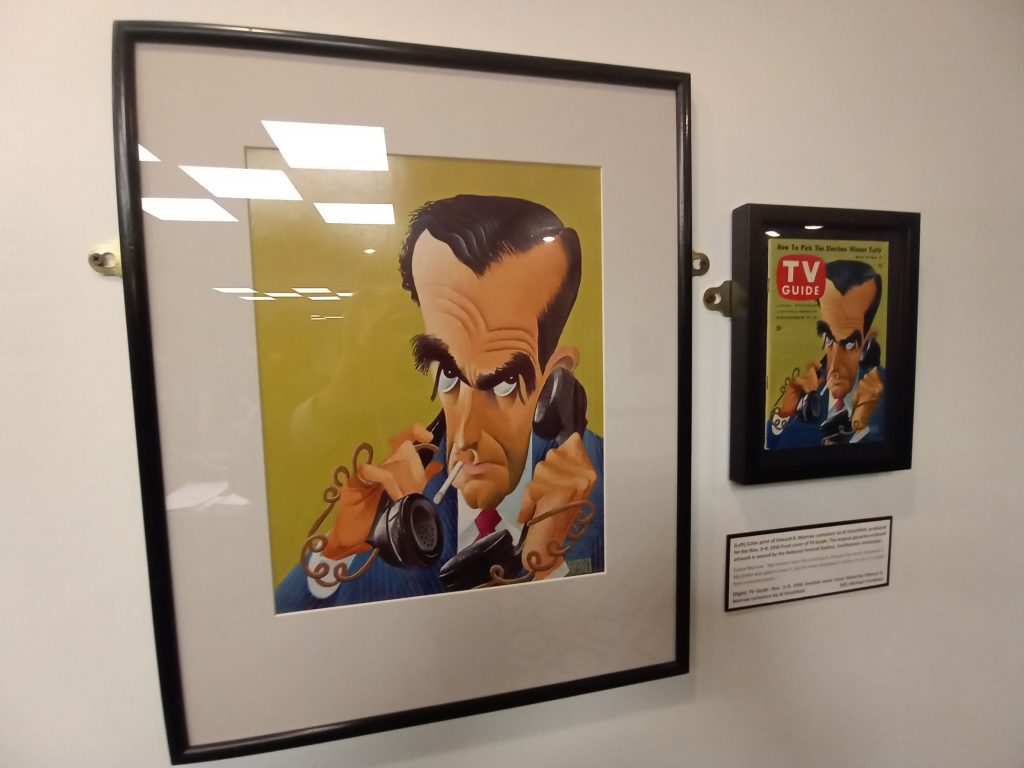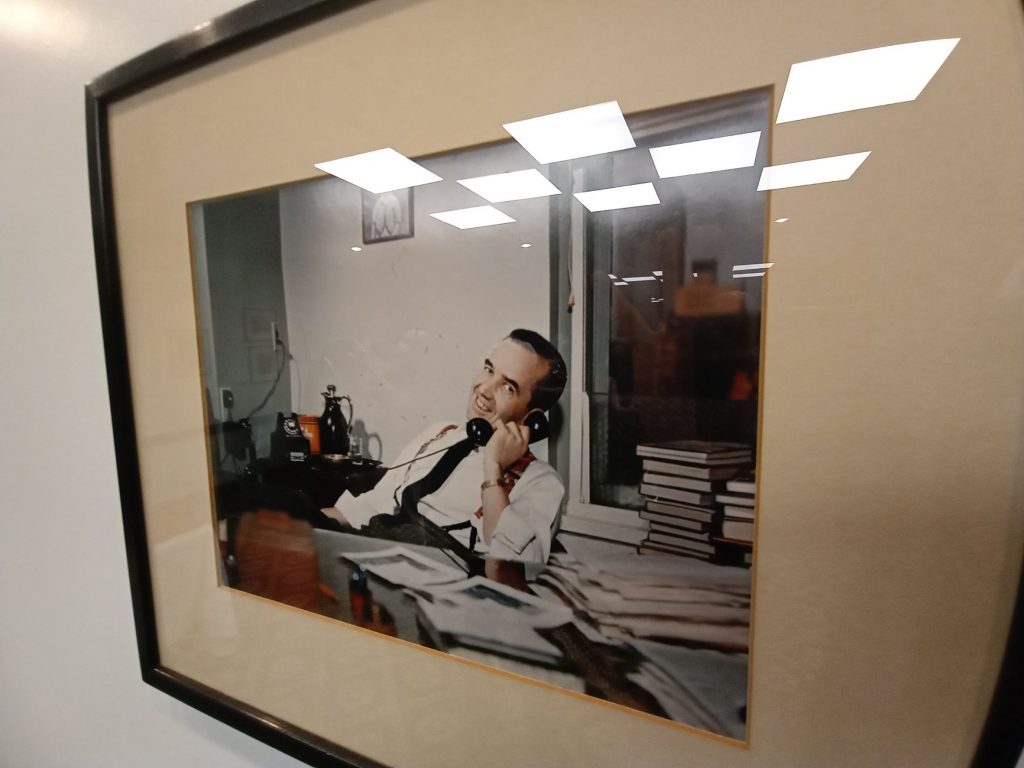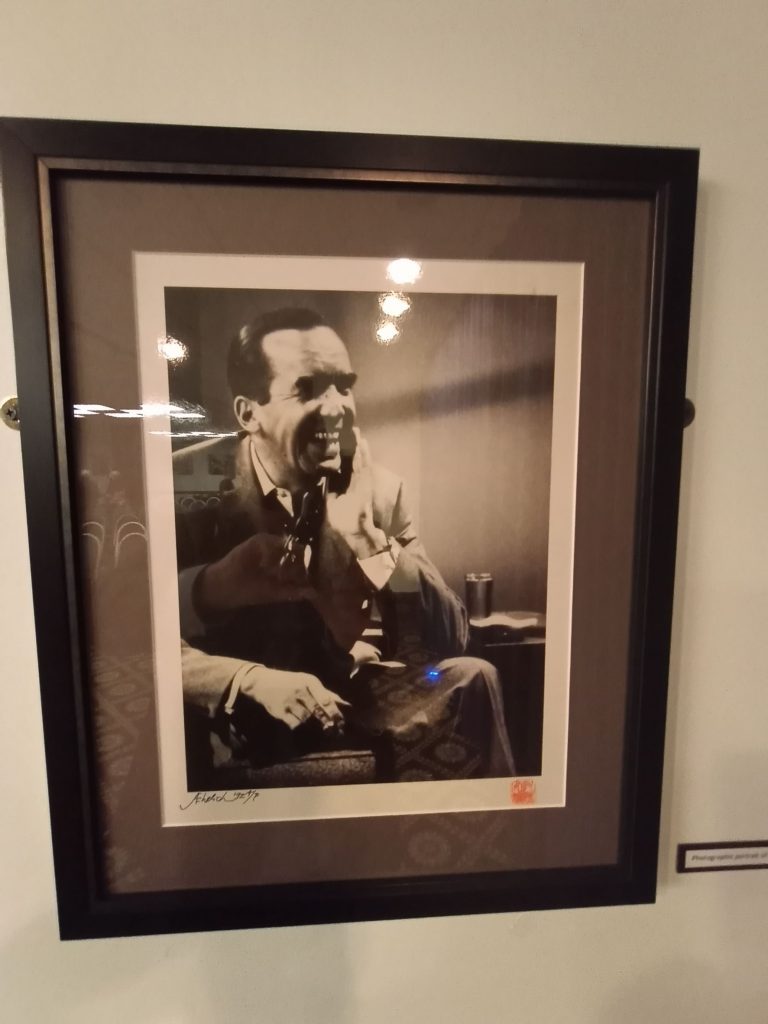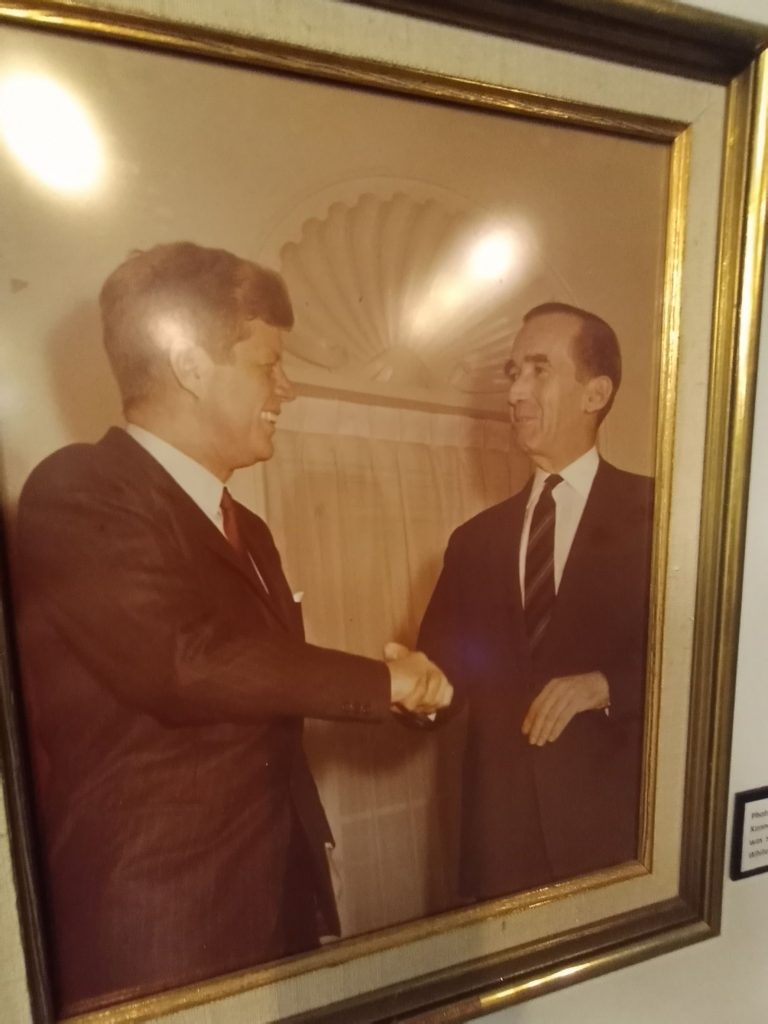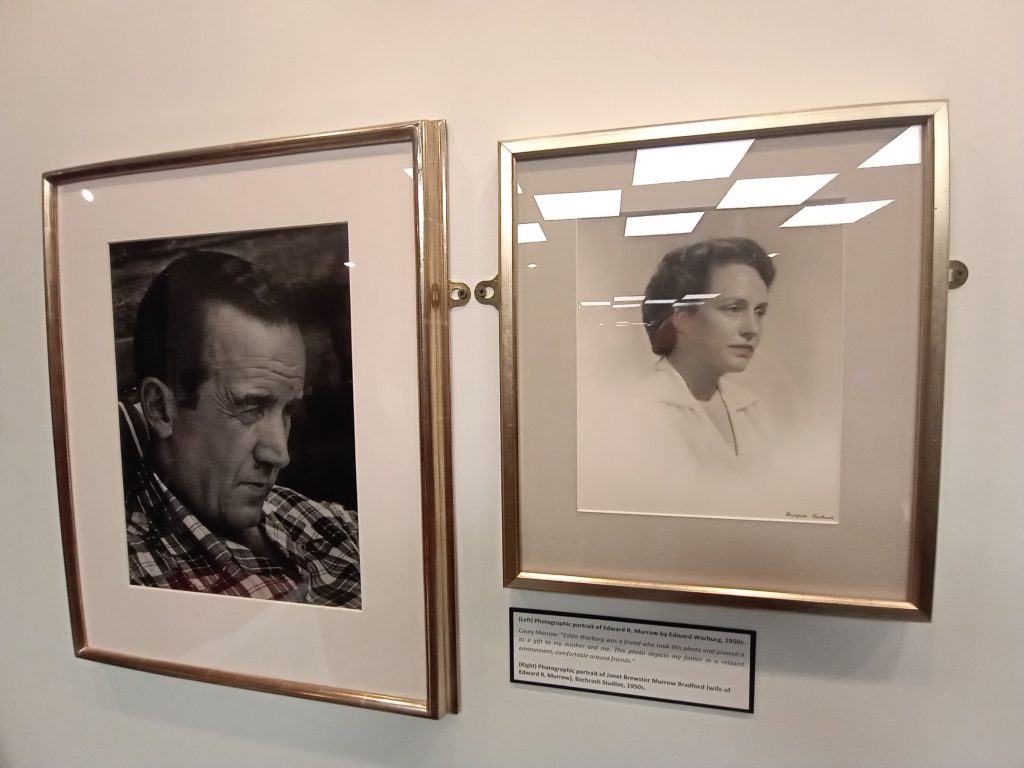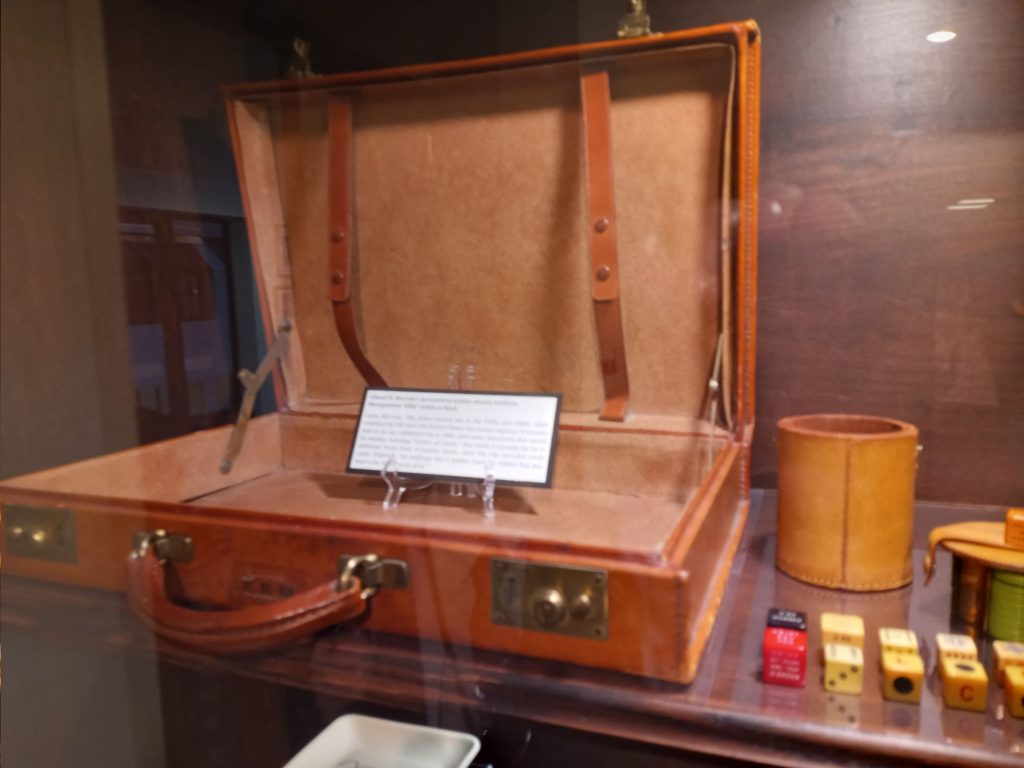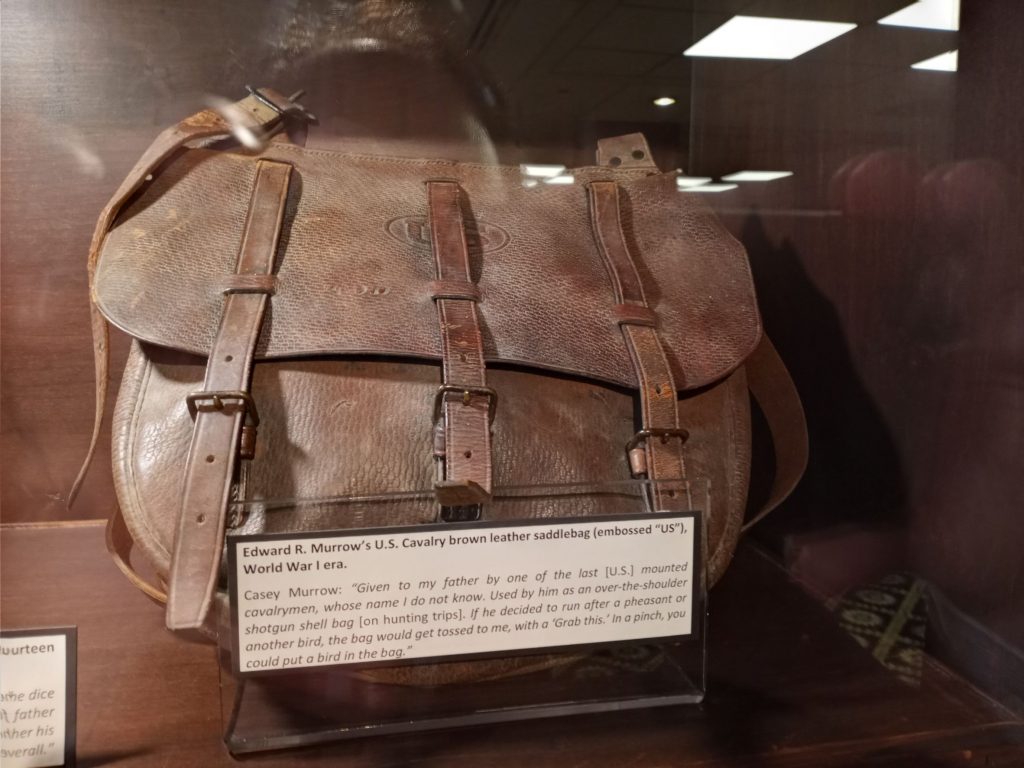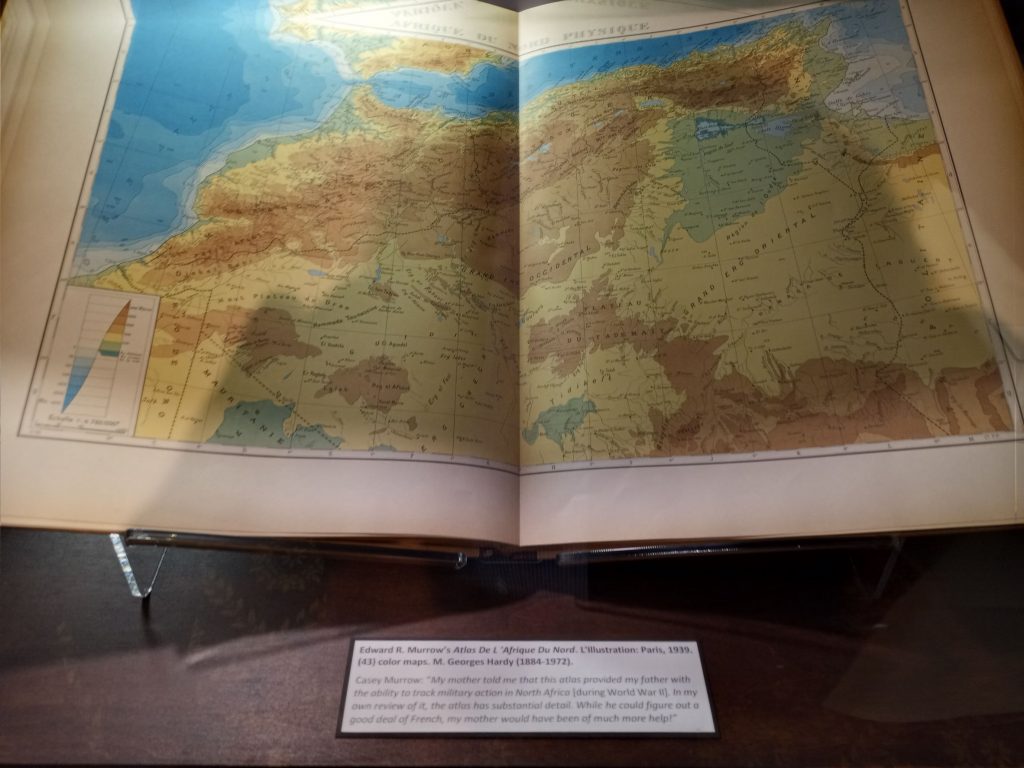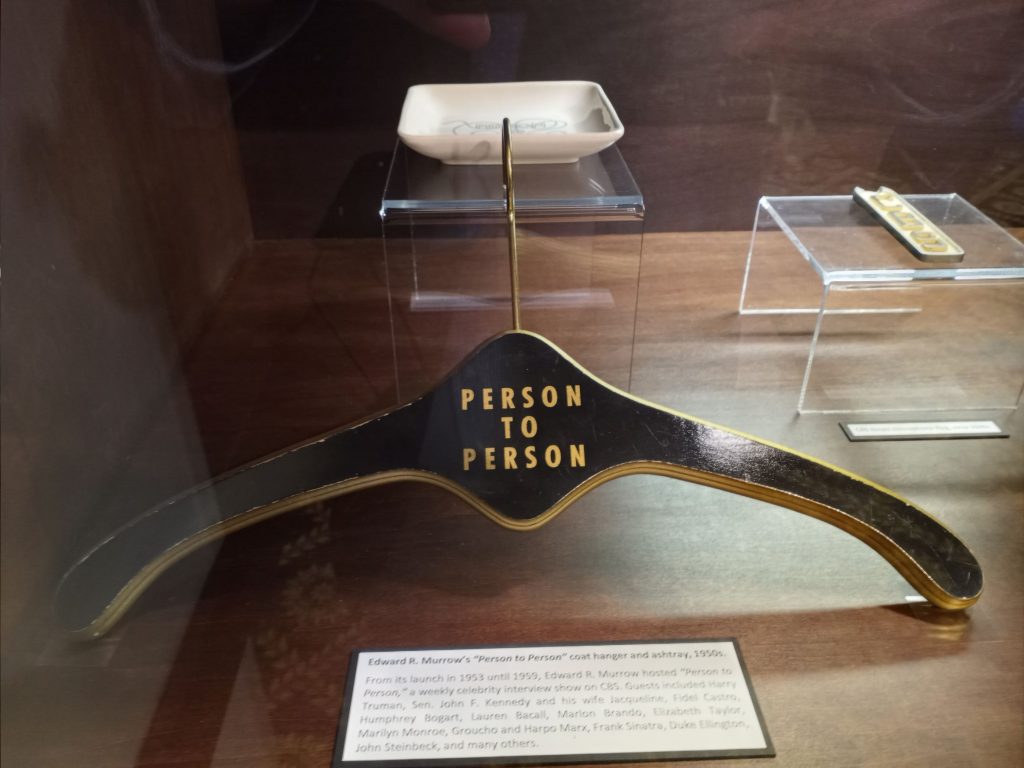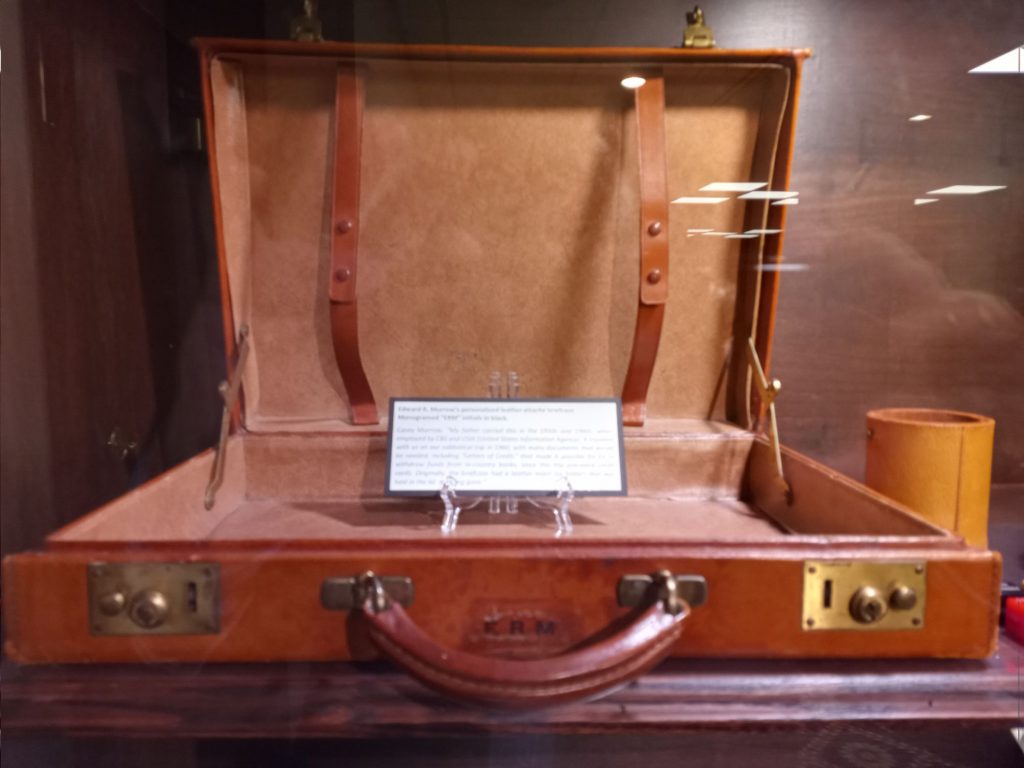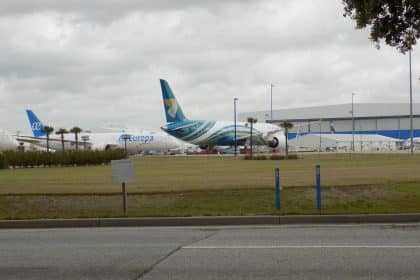Murrow Microphone to Remain at National Press Club
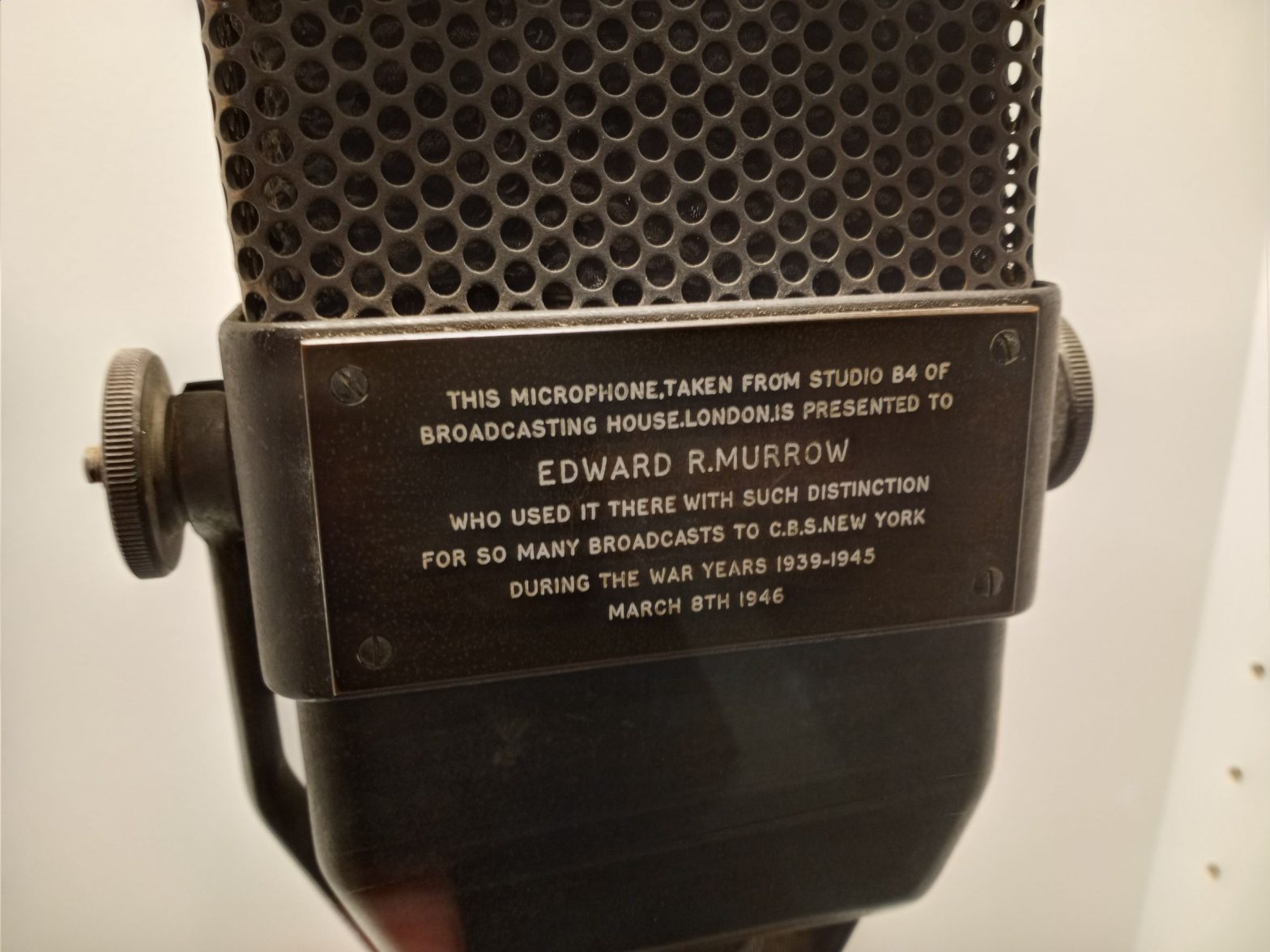
WASHINGTON – The historic BBC microphone that Edward R. Murrow used during his CBS radio broadcasts from London during World War II has found a permanent home at the National Press Club.
The announcement came as the surprise climax of a reception Tuesday night honoring Murrow’s family and commemorating its recent donation of several items from the legendary journalist’s personal archive.
It was also a fitting celebration of the Press Club presidency of Mike Freedman, a former general manager of the CBS radio network, whose one-year term was marked by the coronavirus pandemic and a deepening of the organization’s relationship with the Murrow family.
In his first act as club president, in January 2020, Freedman awarded Murrow’s son Casey with a lifetime membership, and Casey responded with donating miscellany of his father’s possessions including his briefcase, a World War I era leather cavalry bag, poker chips, mementos of Person to Person television show and a number of historic photographs.
He then went a step further, last fall, when he agreed to lend the club the legendary microphone — often referred to as the “holy grail of radio journalism” — for display at its 2020 Fourth Estate Awards ceremony, which happened to be honoring CBS News President Susan Zirinsky, the first woman to head a major network news division.
The loan was made “on a whim,” Freedman said, and it was “extended and extended” in the belief that not enough people had had the opportunity to visit the club and “enjoy and be inspired by it.”
A plaque on the microphone reads: “This microphone, taken from studio B4 of Broadcasting House, London, is presented to Edward R. Murrow who used it there with such distinction for so many broadcasts to CBS New York during the war years 1939-1945.”
The inscription is dated March 8, 1946.
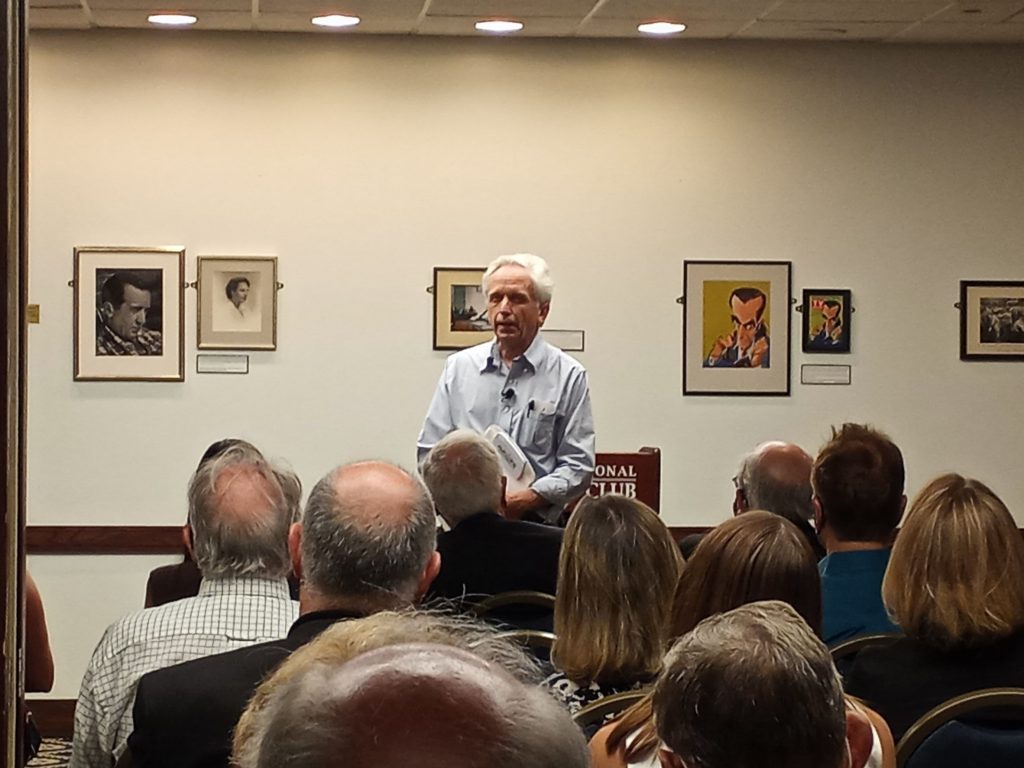
Compounding its historic aura is the fact Ed Murrow himself referred to it In a 1955 BBC interview as “the only trophy I ever kept.”
Murrow added that receiving it when he departed London after nine years, was ‘the most touching thing that ever happened to me.”
“This I value above anything I have,” he said.
Casey Murrow, who has the open and approachable bearing of a friendly, soft-spoken New Englander, explained Tuesday night that over a “period of years” his family had wondered what to do with what he described as “this remarkable artifact.”
“Obviously, it does represent an aspect of radio journalism that is one of a kind, most surely,” he said. “And it’s been in the family for 56 years [since the elder Murrow’s death in Pawling, New York on Apr. 27, 1965].”
“Now it has a new home with the Freedman family,” he said.
Mike Freedman quickly explained that as he and Murrow continued to talk over the course of the past year “an extraordinary opportunity” materialized as “a private acquisition and a public service.”
Mike and Rene Freedman acquired the microphone “with deep appreciation to the Murrow family” with the intention that it will stay at the club, where it is now housed in a prominent case on the 13th floor of the organization’s namesake building, “to continue to inspire journalists for generations to come.”
Prior to the announcement, Casey Murrow gave a talk in which he discussed each of the donated items, revealing for instance, that his father used the cavalry bag to hold his shotgun shells during hunting trips, and that because a map he used of North Africa during the second World War was in French, his mother, the journalist and fluent French speaker Janet Murrow, likely had to translate it for him.
He also revealed his father’s love of Josh Billings, the 19th-century American humorist best remembered into the 20th century for his pithy quotations.
“Here’s a quote Dad would sometimes read out loud to people in his office,” Murrow said as he approached one framed document. “It’s better to know less than to know so much that isn’t true.”
“Another one he often quoted to me is, ‘Silence is a hard argument to beat.’”
At another point, Murrow stopped in front of a photograph of Carl Sandburg, the poet and biographer, speaking in front of the Lincoln Memorial.
Sandburg had won the Pulitzer Prize for his biography of Abraham Lincoln.
“This is a particularly important piece to me,” Casey Murrow said. “It’s signed by Sandburg and says, ‘To Edward R. Murrow, reporter, historian, inquirer, actor’ … and finally … ‘seeker,’ and I’ve always thought, ‘What a fascinating term to apply to Edward R. Murrow, thinking of the whole image of being a seeker, of following stories, as he often does, very carefully.’”
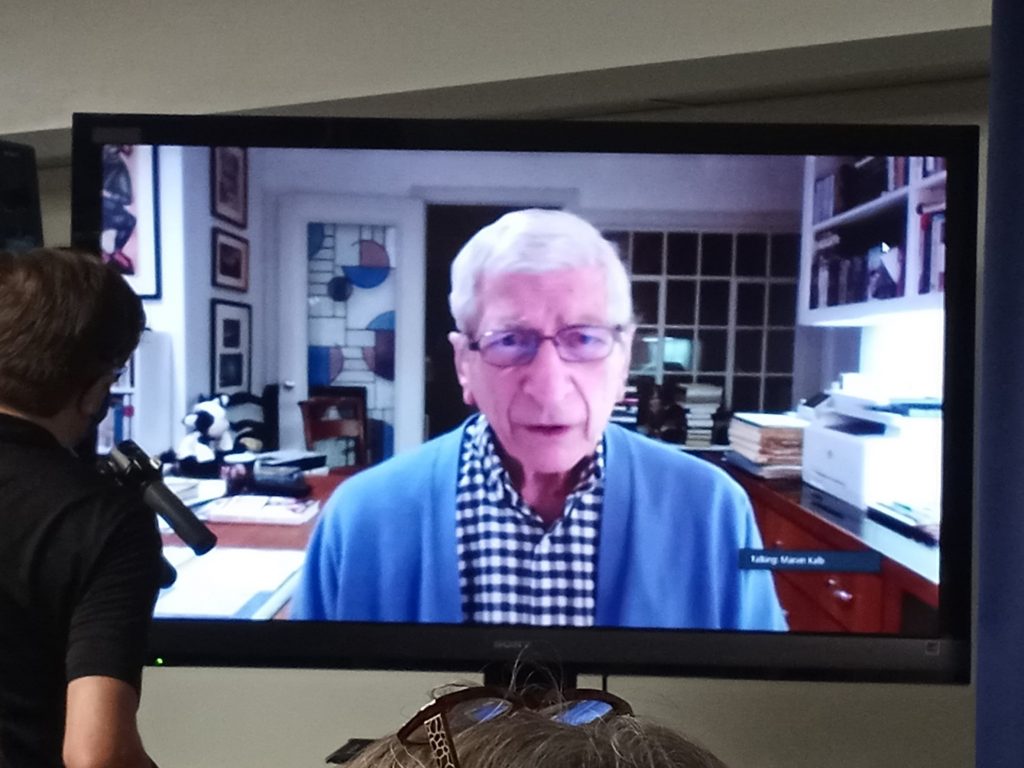
As Murrow continued to discuss the various pieces in the room and answer questions, Freedman dug out a quotation about Murrow written by Richard C. Hottelet, who at the time was the last surviving member of “the Murrow Boys,” a World War II-era team of war correspondents recruited by Edward R. Murrow at CBS.
“Even now, many years later, I think of Ed Murrow in superlatives,” Hottelet wrote. “[He was] a skilled, tenacious reporter, a brave man, and a fine human being.”
“As a boss, Murrow laid down no rules, made no suggestions as to style or content,” Hottelet continued. “He demanded only a clear and, where appropriate, colorful presentation of fact. He was scrupulously fair, and his colleagues accepted his choices without complaint. He led by example, not command.
“Murrow’s usually furrowed brow expressed a pessimistic side, perhaps to guard against indulging a nationwide audience that wanted good news. Yet when he smiled, it was like a sunrise.
“He knew his own worth, but was not arrogant or overbearing. He had a sense of theater, as in his stress on ‘This is London,’ when he began his broadcasts, as well as in a Churchillian sonority that often marked his speech.
“Murrow’s physical bravery was matched by moral courage that rang out in his television documentaries. His style was serious. Long experience at the microphone did not make him casual. He saw his broadcast as a service to the American people.”
“I’m interested in your take on Richard Hottelet’s take on your dad,” Freedman said.
“Well, I love that quote, “ Casey Murrow said. “And I think it’s remarkably accurate. He certainly did struggle with pessimism sometimes, and with anxiety about doing the right thing, which he stewed about a tremendous amount of the time — Stewing being a word he liked to use. But yes, I think that description of my dad is accurate.”
Also taking part in the reception, albeit remotely from his home, was Marvin Kalb, who was the last journalist Murrow hired to work at CBS and who, at 91, continues to host The Kalb Report, a program in its 27th year on public television.
Kalb recalled growing up listening to Murrow’s broadcasts during World War II and becoming “fascinated by the quality and content of what Murrow presented to all of us.”
The two weren’t destined to meet, however, until 1957, when Kalb, then attending Harvard University, wrote a piece for The New York Times magazine on Soviet youth.
“The day after the article came out I was in the Widener Library at Harvard and the librarian comes over, taps me on the shoulder and says, ‘Marvin, there’s a man on the phone who identifies himself as Edward R. Murrow and he would like to talk to you.’
“So I turned to her and said, ‘Oh it’s probably some quack, Edward R. Murrow is not going to be calling me.’ And I went back to my work,” Kalb said. “Later that afternoon the librarian returns and says, ‘Marvin, it’s that same man again, and he says he’s Edward R. Murrow and he would like to talk to you.’
“Well, I figure, what the heck, so I picked up the phone … and the minute I heard his voice I realized what a total jackass I had been for not talking to him immediately that morning. It turned out he had read my article and liked it and he said he’d very much like to talk to me in person, could I join him in his New York office the following morning?
“I said, ‘Yes sir, and I was there at nine o’clock,’” Kalb said. “The secretary said our conversation would last no more than 30 minutes. I said that was fine with me … and we wound up talking for three hours. He was intensely interested in everything relating to the Soviet Union. He wanted to know about Soviet youth, what was on their minds, what was their association with politics, what they thought about religion, family life …. What was their vision of the future?”
“Finally, his secretary comes in and says, ‘You’ve got a lunch. You’ve got to be going.’ And he says, ‘Yes,’ stood up, put his arm around me and said, ‘Marvin, by the way, how would you like to come join CBS and work with me?’ Well, in a flash I said, ‘Yes, of course.’”
Kalb said he believes that from that moment Murrow projected him on the path to become CBS’s Moscow correspondent.
“I put in my time. I started working at CBS radio, on the overnight shift, and made all the steps I had to do along the way until I finally got to Moscow. And I think I’d only been in Moscow for six months when, in January 1961, President Kennedy asked Murrow to be head of the United States Information Agency, parent of the Voice of America.
“Murrow invited me to join him at the U.S. Information Agency and help him do things to figure out the communist challenge to the United States in the height of the Cold War,” Kalb said. “And it was one of the most painful decisions of my life … But I felt that I had to say no to him.
“I had a feeling he’d understand, So I picked up the phone and I called him, and I said, please understand, I would love to work with you, but I feel I want to be here in Moscow. And he said, ‘I understand completely. It’s the right decision. Do it and continue to do it.’ Well, I certainly made a pledge to myself at that time, that if I could do it in the spirit of and adhering to the quality of the Murrow tradition, I would be doing the right thing. And since that time, I have always tried to operate and function as a reporter, very much in the shadow of the great tradition of Ed Murrow.”
Tuesday’s Murrow event was co-sponsored by the National Press Club’s Broadcast/Podcast and History & Heritage teams, along with the club’s Board of Governors and the National Press Club Journalism Institute Board of Directors.
